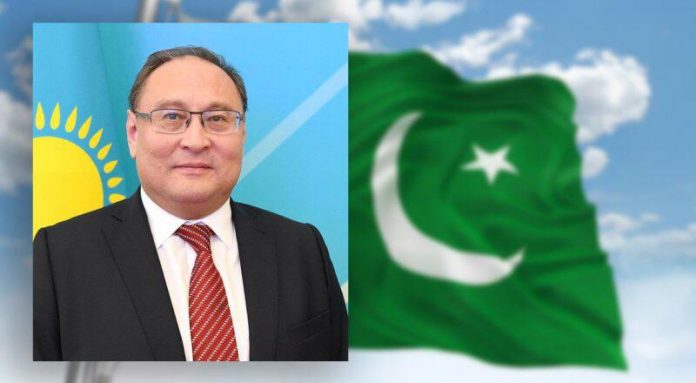Akan Rakhmetullin
On December 16, 2020 Kazakhstan is celebrating the 29th anniversary of its existence as a sovereign country. In historical terms this is, certainly, not a lot. But what should be well kept in mind, is that modern-day Kazakhstan and its people occupy a huge landmass, where Europe meets Asia and where ancestry of contemporary Kazakhs created and ran states, which had played their own distinguished role in Eurasian history. This is what we in Kazakhstan keep in mind. In doing so Kazakhstan massively marked this year the 750th anniversary of the mighty Golden Horde, whose founders set up the lineage of Kazakh khans. This is the reason why Kazakhstan is fully eligible to identify itself as one of the Golden Horde’s historical heir nations.
It causes no doubt that modern-day Kazakhstan, which is geographically located at the very heart of the world powers strategic interests, is simply destined to bridge Europe and Asia both politically and economically. This is what probably constitutes a fundamental mission of Kazakhstan, which it inherited from its predecessor states, and our country has been following for the last 29 years.
It is not enough to just comprehend the greatness of that mission. One must comply with it in every possible sense. For this reason, from the very onset of our independence in 1991 the First President of Kazakhstan and Leader of the Nation Nursultan Nazarbayev clearly articulated the country’s strong commitment. It is to build up an open, democratic and economically competitive society. That was the primary goal to achieve, what Kazakhstan’s multi-vector and peacemaking foreign policy was aimed at.
We are the world’s largest landlocked country, which makes us in turn to be keen in benefiting from it through extending the network of trade and transport routes in every possible way via Kazakhstan terrain with the aim of linking Europe and Asia, as did earlier the Great Silk Road.
After all, a primary time milestone for our country is 2050, which is expected to be the year of Kazakhstan’s joining the list of 30 most developed countries in the world. Kazakhstan has everything to meet this incredibly ambitious objective, and all we need to do is just to be sufficiently intelligent and careful in handling assets we have.
Kazakhstan is known today as the largest economy across Central Asia. This largely occurred due to our country’s possession of vast natural resources and skilled workforce. This, in turn, enables the government to develop vigorously the national economy’s diversification policy, leading the economy away from its any exorbitant dependence solely on raw materials export. Therefore, there are some initiatives that are taken for implementation to develop the economy in various areas, such as transport, pharmaceuticals, telecommunications, petrochemicals and the food industry.
Another unique feature of the Kazakh economy is its openness and attractiveness for investments, including ones from the outside. This is brightly demonstrated by the relative statistics. Within the period from 1991 up to 2020 Kazakhstan succeeded to attract into its domestic economy 330 billion US dollars as direct foreign investments. This amount of investments certainly indicates that foreign investors are willing to come to Kazakhstan because of its political stability, educated personnel and capability to provide access to large regional markets. For instance, Kazakhstan membership in the Eurasian Economic Union makes investors access the Russian market with more than 140 million consumers and the common market of the Union with more than 180 million consumers.
Apart from that, by opening reginal offices in Kazakhstan overseas companies get easier access to the markets of West China (300 million consumers) and those of the Caspian countries (150 million consumers). This sort of understanding encouraged some big international companies to open their regional headquarters in our country. A number of global technology leaders and international companies, such as General Electric, Toyota Motors, Chevron, Hyundai Motors, Sanofi, Linde, Metro Group, Peugeot and Sumimoto Metal Mining, currently operate in Kazakhstan.
It is worthwhile to note that private investors activity in Kazakhstan is also driven by the Kazakh government’s forceful policy, which is designed to decrease steadily the volume of the state involvement in the economy. For example, over the last three years about 500 Kazakhstani companies were put up for sale under the privatization program, while assets sold to investors accumulated about 500 million US dollars. Privatization of large state-owned enterprises will keep going until the state’s share in the Kazakh economy reaches 18%.
Furthermore, the government’s measures to stimulate the growth of small and medium-sized businesses suggest that their total share in Kazakhstan GDP will increase to 35% by the year 2025. This goal is also to be achieved through implementation of the national strategy for gender equality, published in 2017, aimed at increasing women’s share in small and medium-sized businesses.
All business activity stimulating measures to have been mentioned above are reflected and well credited in leading international rating studies. Thus, the World Bank’s “Doing business for 2020” report ranks Kazakhstan as the 25th in the world, what is three positions higher, compared to last year’s indicators.
The spread of COVID-19 throughout the globe had certainly a negative effect to the Kazakh economy’s growth rates. But even these sorts of unfavorable circumstances prove the degree of Kazakhstan economy’s openness to the outside world and its inevitable dependence upon ongoing trends in the global economy. Nevertheless, Kazakhstan’s GDP growth is expected to reach 2.8% in 2021 and 4.6% by 2025.
Upcoming parliamentary elections, scheduled to be held on January 10, 2021 should also contribute to further stabilization of the socio-political situation in Kazakhstan. It should be noted that the elections will be held after some norms were introduced into the legislation in the middle of the current year. These norms are to make the competition among political parties more intense and to confirm Kazakhstan’s commitment to develop truly democratic and responsible civil society.
There is no doubt that such massive economic and domestic political transformations cannot be drafted and implemented without favorable external conditions properly ensured. This is exactly the most fundamental task of Kazakhstan’s foreign policy, which has constantly been designed to develop a peaceful and constructive dialogue with all countries of the world.
It is well known that at the very beginning of the 1990-s our country, which then was little known in the world, renounced nuclear weapons it inherited from the USSR, and shortly before that renouncement closed the Semipalatinsk nuclear test site on its territory. Besides, Kazakhstan and other brotherly regional countries did their best to fix in legal terms the status of Central Asia as the nuclear-weapon-free zone.
Later on, of course, foreign policy of Kazakhstan got a massive credit from the international community. Over the years it became visible, when Kazakhstan was elected a chair country in some big international organizations, for instance, the Organization of Islamic Cooperation, as well as hosted global international events. Among the latter events the Summit of the Organization for Security and Co-operation in Europe (OSCE) and the First Organisation of Islamic Cooperation Summit on Science and Technology both held in Kazakhstan in 2010 and 2017 respectively, are to be particularly noted. Election of Kazakhstan as a non-permanent member of the United Nations Security Council for the years 2017-2018 was our foreign policy’s another great achievement, which significantly raised our understanding of what were the essence of global problems and their possible solutions.
Nowadays Kazakhstan is trying to apply this understanding upon the way it develops interstate relationship with all countries over the world, including, definitely, friendly Pakistan. With this in mind Kazakhstan greatly values a high- level political partnership between our countries, which was established from the very beginning of Kazakh-Pak relations.
The Independence Day is always a good opportunity for us to recall those countries, which were among the first to recognize Kazakhstan as a sovereign and independent state. One of them, as it is known, was Pakistan, which Kazakhstan legalized cooperation principles with in February of 1992 at the state visit of the President of H.E. Mr. Nursultan Nazarbayev to Islamabad. Since then relations between Kazakhstan and Pakistan have developed only in a friendly and constructive way. Today the main task for both sides is to make a bilateral interstate dialogue a systematic and tangible result-oriented one, both in bilateral and multilateral cooperation formats.
The 9th meeting of the Pakistan-Kazakhstan Joint Intergovernmental Commission on Trade, Economic, Scientific, Technical and Cultural cooperation, which was held in Islamabad in February 2020 appeared to be a major breakthrough in a domain of a bilateral relationship. The meeting outcomes set up some long-awaited new guidelines for development between Kazakhstan and Pakistan in the years to come. Another point with regards to that Intergovernmental Commission meeting was that it took place after a five-year break following the previous meeting and surely became for this reason a quite notable event within the chronology of official Kazakh-Pak contacts through the outgoing year of 2020.
Another big event for bilateral relations was the maiden round of political consultations to have been also held in Islamabad in February 2020 at the level Foreign Ministries.
I note with great sense of satisfaction that trade volume between our countries, which was steadily declining over the past few years, has visibly increased this year. According to the Kazakhstan’s Bureau of National Statistics, the trade volume amounted within January-October 2020 to almost 37 million US dollars, while it totalled just 27 million US dollars through the entire 2019. These indicators are very clear to show us that trade and economic cooperation between our countries definitely has a potential to be further enhanced and extended.
Besides trade and economic relationship, Kazakhstan is very interested in exploring Pakistan’s vast experience in carrying out peacekeeping missions under the UN mandate. Defence and Foreign ministries of both countries are already in touch with mutual intention to develop this UN peacekeeping domain of Kazakh-Pak relationship. My personal belief is that launching a bilateral cooperation on international peacekeeping track is likely to be the best demonstration of friendly cooperation existing between Kazakhstan and Pakistan.
In conclusion I would like to extend the hope that the forthcoming year 2021, or the year of the 30th anniversary of Kazakhstan’s Independence, will be even more prolific in terms of Kazakh-Pak contacts to get our bilateral relations stronger.
The writer is the Ambassador of Kazakhstan to Pakistan.

















